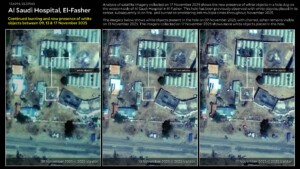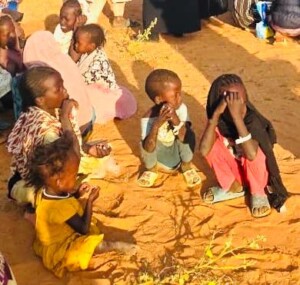Analyst: ‘Lifting of subsidies in Sudan leads to social, political instability’
Economists continue to warn against the consequences of lifting subsidies on commodities in light of the decline in the purchasing power of the Sudanese Pound and the continuing surge of prices in the country. The Dollar reached a new record price against the Sudanese Pound on Thursday.
 A shop at the Grand Omdurman Market (steel-safari.co.uk)
A shop at the Grand Omdurman Market (steel-safari.co.uk)
Economists continue to warn against the consequences of lifting subsidies on commodities in light of the decline in the purchasing power of the Sudanese Pound and the continuing surge of prices in the country. The Dollar reached a new record price against the Sudanese Pound on Thursday.
Lifting subsidies on basic commodities will lead to a suffocating crisis. It will negatively affect all sectors of society, and lead to social and political instability in the country, according to Prof Hasan Bashir, Economist and Director of the Red Sea University.
In an interview with Radio Dabanga on Thursday, he warned that lifting the subsidy on petrol will lead to higher inflation and a collapse in purchasing power.
“The lifting of subsidies is an economically irrational and extremely dangerous plan in light of the low indicators of growth and savings,” he warned. “Most Sudanese live in extreme poverty. They will not be able not bear the loss of government funding.”
Bashir pointed out that there are no mechanisms planned to compensate for the shock of lifting subsidies such as social security systems, health insurances or other social support for the poorest sectors. “A direct support mechanism is currently unavailable and difficult to implement.
“The repeated talk about lifting subsidies, liberalising the Dollar, and raising the rate of the Dollar for customs fees has already led to the increase in commodity prices,” he said, and described “talks about foreign exchange liberalisation in the absence of adequate reserves while parasitic activities are not being tackled” as “futile”.
He criticised the slowness of the government in fulfilling the obligations of the Sudanese revolution, including the dismantling of institutions set-up during the reign of ousted President Omar Al Bashir, and addressing the hoarding of basic commodities by affiliates of the defunct regime.
Way-out
According to the professor, the way-out is to attract foreign currencies, stabilise the exchange rate, control the inflation, instead of “leaving the exchange rate floating and lifting subsidies on goods which was the National Salvation Regime’s economic approach par excellence”.
In order to tackle the current economic crisis, holding companies should be established in partnership with the private sector in the field of production and control of export sectors, especially exports of oil seeds, cotton, gum Arabic and livestock.
The government should further take steps to strengthen its control of the gold sector, become a production partner, and establish a gold exchange market.
The Ministry of Finance should investigate companies owned by security and military officers, as well as other institutions set-up by members of the defunct regime, and use them for the interest of the country.
“Yet, most important is the tightening of control over the market prices, creating incentives for investors, and working with partners in order to relieve the life of the poorest,” Bashir said.
He called for speeding up the peace agreement, revitalising border trade, securing the oil pipelines with South Sudan, as well as making efforts in lifting the western sanctions on Sudan.
“Most important is the tightening of control over the market prices, creating incentives for investors, and working with partners in order to relieve the life of the poorest,” Prof Hasan Bashir, Economist and Director of the Red Sea University
The professor expressed his hope that the economic conference scheduled for March will come out with recommendations for an economic recovery roadmap.
He also expects that the donor conference, planned to be held in June, will lead to foreign currency support, assistance in financing the production process and exports through partnerships with the private sector in Europe. Yet, a breakthrough in the field of foreign investment in the productive sectors can already be expected in the coming months.
Bashir expressed his happiness concerning “the breakthrough in international relations”. He pointed to the possibility of Sudan obtaining support from the European Union, the arrival of the German President to Sudan accompanied by a large economic delegation, and visits by US businessmen and members of the American Congress, considering “the external openness a positive sign in the direction of relief of our crises”.
‘Lack of vision’
Other independent economic experts have cited the instability of the Dollar exchange rate and subsidies as major factors in Sudan’s economic crisis.
In an interview with Radio Dabanga earlier this week, former banker Hafiz Ismail, said that “the current economic crisis is attributable to the lack of vision and the absence of an economic plan to manage the crisis”.
Failure to tackle the economic crisis will “neutralise the public towards the government and increase the growing rejectionist trend”, he warned.
In a separate interview with this station, Professor Hamid Eltigani, Head of the Department of Public Policy and Administration at the American University in Cairo, warned against “an explosion in the country” in case the economic crisis is not dealt with.
He called for a gradual lifting of subsidies on fuel, and normalisation of the exchange rate between the Sudanese Pound and the US Dollar.
Currency market
The price of the Dollar on Thursday reached SDG 108, compared to SDG 107 on Wednesday, currency traders in Khartoum told Radio Dabanga. The selling price of the Euro became SDG 114.
The UAE Dirham scored SDG 27.7 on Thursday, while the selling price of the Saudi Riyal rose to SDG 28.5.
In a press conference on Saturday last week, Minister of Finance Ibrahim El Badawi confirmed the parallel market supremacy over the currency trading. “The parallel currency markets are rich and the official market is poor.”
He stressed the need to make liberalise the exchange rate for private sector transactions as well as for cash transfers of Sudanese expats to the country, in order to control the black market.
The official rate of the USD is SDG 54.64 (Central Bank of Sudan).
Sudan’s annual inflation rate rose to 64.28 per cent in January, from 57.01 per cent in December.
Radio Dabanga’s editorial independence means that we can continue to provide factual updates about political developments to Sudanese and international actors, educate people about how to avoid outbreaks of infectious diseases, and provide a window to the world for those in all corners of Sudan. Support Radio Dabanga for as little as €2.50, the equivalent of a cup of coffee.












 and then
and then